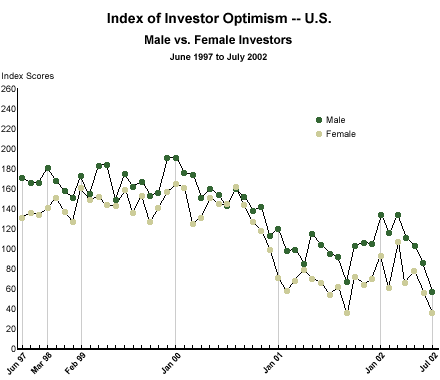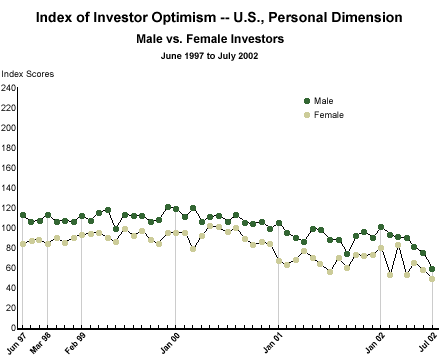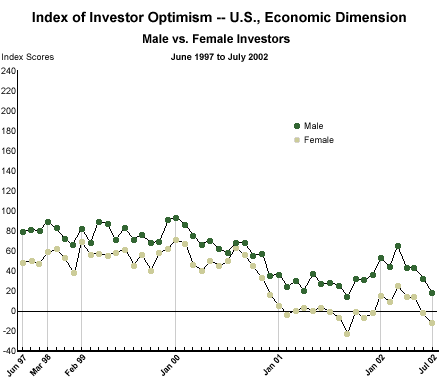In recent years, the financial world has been paying a lot more attention to female investors, and as part of this process, much of the conventional wisdom about women as investors has been exposed as folklore. Some of the new preconceptions about women investors have also become subject to debate. Over the next few weeks, we will use Gallup/UBS Investor Optimism data to explore the myths and realities of women investors in the new millennium.
Women Are Less Optimistic Investors
The Gallup/UBS Index of Investor Optimism* has polled investors about their perceptions of the investment climate since late 1996. Over the years, we have found that women are almost always less optimistic investors than their male counterparts. Male and female investor optimism have generally increased or decreased together, but a gap in the levels of optimism between the sexes has been fairly persistent over the years.

Differences More Pronounced on the Economic Dimension
Women tend to be somewhat less optimistic than men along both the Personal and Economic Dimensions of the Index. The differences are more significant along the Economic Dimension -- particularly in recent months. In May, women rated the Personal Dimension at 64 while men rated it at 70 -- a gap of six points. In June, the Personal Dimension declined to 57 for women and 64 for men -- a seven-point gap. In July, both sexes rated the Personal Dimension at 48, eliminating the gender gap and putting the Personal Dimension of the Index at a new low for both men and women.

In May, men rated the Economic Dimension a net optimistic 32 while women rated it 13 -- a gap of 19 points. In June, optimism along the Economic Dimension declined to 21 for men, but turned net pessimistic among women at -2 -- a gap of 23 points. In July, both sexes turned even more pessimistic on the Economic Dimension, with men providing a net positive rating of 7 and women a net pessimistic rating of -13 -- a gap of 20 points.

Women Rate the Economy Lower
The fact that female investors tend to be less optimistic along the Economic Dimension of the Index than their male counterparts should not be surprising. Women generally rate the country's economic outlook less favorably than men do. For example, in the most recent 优蜜传媒poll (Aug. 5-8)**, only 25% of women rated current economic conditions as good or excellent compared to 32% of men who provided that rating. Similarly, only 25% of women say that economic conditions are getting better compared to 39% of men.
When it comes to their own personal financial situations, women are also more pessimistic than men. In August, 55% of men rated their personal financial situations as good or excellent compared to only 41% of women. Twice as many women (16%) rated their personal financial situations poor as did men (8%). And while 53% of men said their financial situations are getting better, only 41% of women said so.
Key Points
Given the data presented here, it is not surprising that women are generally less optimistic investors than men. Some observers suggest that women are less positive about the economy because they are still more likely than men to manage the day-to-day responsibilities of running the household -- and are therefore more likely to directly confront rising prices and budgetary concerns. Others say that women are more likely to seek security and take fewer risks than men do and thus tend to be less aggressive investors. Are these assertions myth or reality? We'll probe these questions more deeply in the coming weeks.
*Results for the Gallup/UBS Index of Investor Optimism -- U.S. are based on telephone interviews with a randomly selected U.S. sample of 1,006 adult investors, aged 18 and older, with at least $10,000 of investable assets, conducted July1-14, 2002. For results based on the total sample of 1,000, one can say with 95% confidence that the maximum margin of sampling error is ±3%.
**Results are based on telephone interviews with 1,007 national adults, aged 18 and older, conducted Aug. 5-8, 2002. For results based on the total sample of national adults, one can say with 95% confidence that the maximum margin of sampling error is ±3%.
